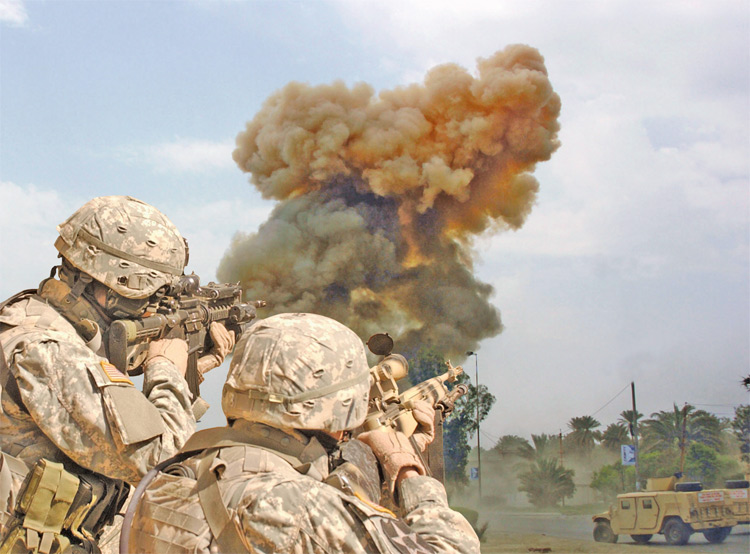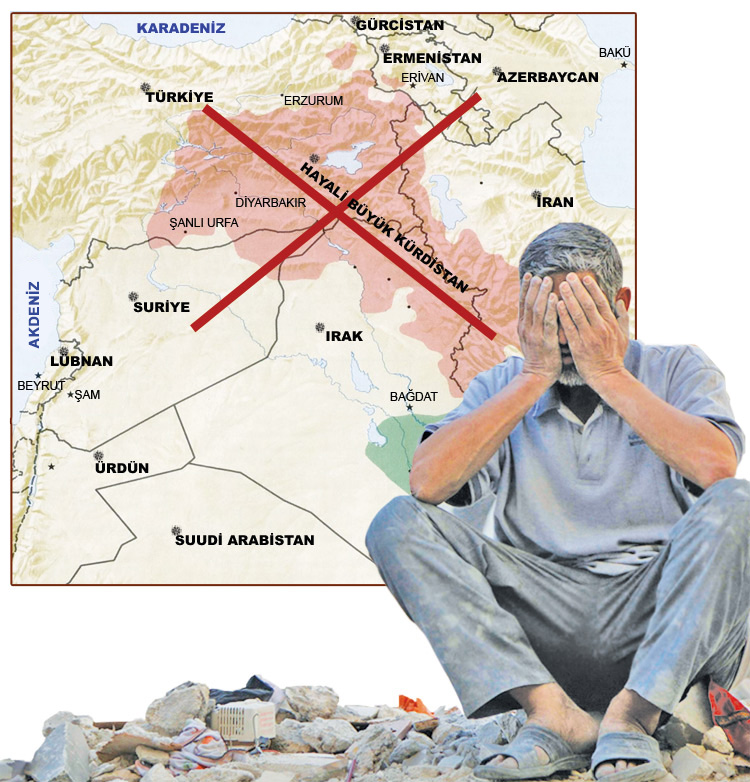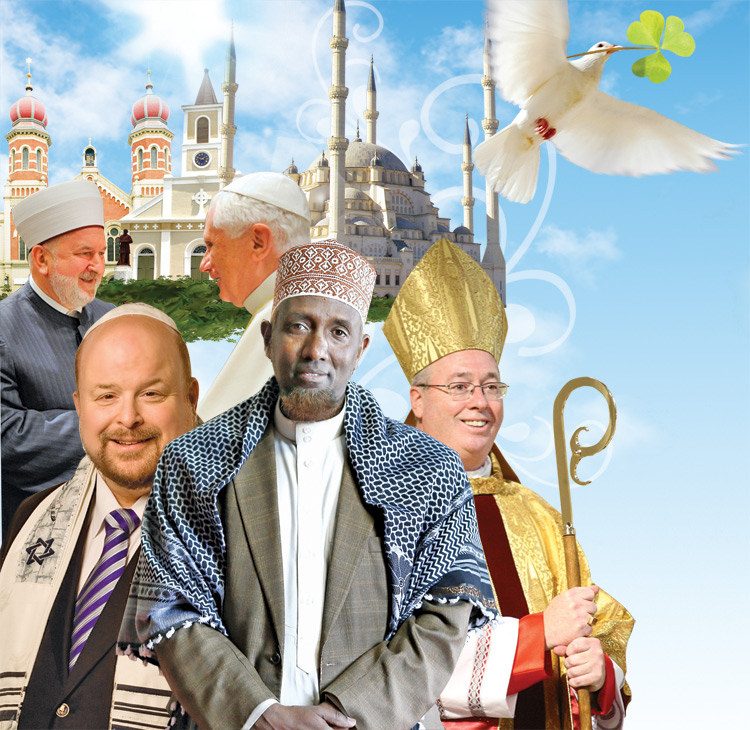Plans concerning the weakening and the break-up of the Middle East before the Ottoman Empire collapsed based on such agreements as Sykes-Picot were probably one of the subjects that most preoccupied and were most discussed by intelligence agencies for many years. Heads of states determined their strategies, and countries their attitudes, on that basis. That is because, as we have seen above, according to Christian Evangelical Fundamentalist belief, the Battle of Armageddon, heralding the return of the Prophet Jesus (pbuh), was expected to take place in those lands. The infrastructure had to be prepared and the climate made suitable for this important appearance.
Various neoconservatives, representing the political wing of Evangelicalism in America, are the main shapers of the plans for the Middle East. This policy they follow sometimes represents a guiding force, sometimes entirely disregards international law and sometimes is even at complete variance with basic U.S. foreign policy. The best example of this is perhaps the Iraq War.
 |
President Ronald Reagan was a neoconservative representative and believed throughout his life that he would see Doomsday. He claimed that his interest in the anti-missile defense system was also to do with his belief in Doomsday. According to Ezekiel 38 and 39 in the Old Testament, a nuclear war would take place on the Plain of Megiddo on Doomsday: Burning sulfur would pour down with torrents of rain, mountains would be overturned and earthquakes would take place. Evangelicals believe that a nuclear explosion is necessary for this to happen. They therefore thought that the groundwork for this was needed to be prepared. Reagan therefore shaped his Middle Eastern policy accordingly and even quoted from the Old Testament to justify the bombing of Libya. According to that view, Libya was one of the major nations that would attack the People of Israel in the End Times. Reagan therefore punished it in advance. 3
Another neoconservative representative, the U.S. President George W. Bush, also believed that he had been appointed by God. He claimed to have received revelation from God during the Iraq War and frequently used terms such as “holy war,” “axis of evil,” “crusades” and “gut instinct.” Iraq was devastated on the pretext of weapons of mass destruction. The Americans suffered severe losses as well and abandoned the country without finding any functional WMD's and the impression of the Iraq War across the world was one of failure. Yet the requirements of Evangelical belief had been implemented, and in their eyes the operation had been quite a success to that end. Iraq had been broken up, just as required, an autonomous Kurdish region had been established and a powerful country ruled by a dictator such as Saddam had turned into an unstable front wracked by terror. Bush based the attack on Iraq from these words from the Old Testament: 4
This is what the Lord says: “See, I will stir up the spirit of a destroyer against Babylon and the people of Leb Kamai. I will send foreigners to Babylon to winnow her and to devastate her land; they will oppose her on every side in the day of her disaster. Let not the archer string his bow, nor let him put on his armor. Do not spare her young men; completely destroy her army. They will fall down slain in Babylon, fatally wounded in her streets.” (Jeremiah, 51:1-4)
Since these words from the Old Testament were taken as a prophecy they began being acted on by Bush, an Evangelical in command of a superpower, the USA. The picture that emerged during the war exactly matching Evangelical objectives meant another step toward Doomsday. Indeed, these words by late Mustafa al-Barzani in the Kurdish region of Iraq, that an autonomous Kurdish region was “ready to become the 51st state” of the USA have to a large extent become a reality now. 5
 |
| The factor behind this state of affairs, not only in Iraq, but also in Syria, Lebanon, Yemen, Libya, and even Egypt is without doubt the illegitimate Iraq War. The Middle East has suddenly been transformed into a sea of blood, and violence has been constantly incited. |
| 1- EGYPT 2- YEMEN 3- LÜBNAN 4- LEBANON 5- SYRIA |
In one sense these things were all manufactured as a kind of investment in the future; this instability in Iraq led the way to the emergence and strengthening of numerous radical groups. ISIL, to which the world has still failed to find a solution, emerged in Iraq while al-Qaeda was aiming its attacks mostly against Iraq. Therefore, the factor responsible for triggering the current state of affairs, not only of Iraq but also of Syria, Lebanon, Yemen, Libya and even Egypt, was the unjustified war initiated in Iraq. Instability, terror and fragmentation came to the region exactly as planned.
The plan also requires that no strong and stable Muslim country should remain in the Middle East. The Middle East must be broken up into very small artificial units that are weak and devoid of will, purpose and character, and thus easy to control. They must be of such a kind that if they escape control or in the event of a disagreement they can easily be destroyed through a simple military operation. The countries of the Gulf are not part of this, since they are already largely under American control and are not part of the Holy Land in which Armageddon is expected to take place. To date, the plan has been successfully (in their eyes) implemented in Iraq, Syria and Egypt. Just two countries remain; Turkey and Iran. These can be broken up and destabilized through the establishment of a Great Kurdistan. Look carefully at the Middle East; all the plans are aimed in that direction.
The main reason for the frequent publication of maps in the US and European press showing Turkey, Saudi Arabia, Iraq, Iran, Syria, Libya, Lebanon and Yemen all broken up in various ways is to prepare the subconscious foundations for this in global public opinion by depicting it as a political requirement. As wars without victors destabilize the region, the arms industry is kept alive and well, stocks of weapons that are not sold off are melted down and enormous capital is obtained for the manufacture of new weapons. The segment of the banking sector that earns revenue from sudden crises also benefits from the climate of uncertainty in the Middle East.
 |
| The drama of the people of the Middle East was not random. The map and the climate designed by secret forces a hundred years ago are being actively applied today. |
Looked at in the light of all these developments, the picture in the Middle East is by no means coincidental. The maps and plans drawn up a hundred years ago now seem to have been made a reality. There is no doubt that perhaps the major share of the blame lies with some Muslims, who produced the infrastructure for these plans - knowingly or otherwise - and permitted this disorder, who have failed to ally themselves with one another and who even regard disputes as a matter of honor. We shall be looking at this in due course.
 |
| Some Evangelicals attach importance to the backing they receive from the Jewish lobby. In fact, however, they believe that a great many Jews will be slaughtered in the bloody war they expect to see in the future. |
When they are in the administration in America and even when they are not, the neoconservatives still remain highly influential by way of various think-tanks and civil society organizations. Of course, the support they receive from some Jews and the Jewish lobby occupies an important place in this. However, a serious discrepancy emerges at this point. As we have already seen, some Evangelicals believe that with the coming of the Prophet Jesus (pbuh), only 144,000 Jews will be left alive by converting to Christianity, while the others will be slaughtered in that great war. Therefore, some Evangelicals regard the Jews as being on the wrong path and are preparing for a war in which they will be slaughtered. On that basis, we may say that these Evangelicals’ attitude toward the Jews is not one of a genuine alliance; it is simply a means to an end.
One can see that in various statements by widely-known Evangelicals themselves. Asked during an address about the identity of the antichrist, the famous 20th-century Evangelical Jerry Falwell gave a most interesting answer: “The Antichrist will, by necessity, be a Jewish male.” 6 In an address given years before, Billy Graham said: “A lot of the Jews are great friends of mine. They swarm around me and are friendly to me, because they know that I am friendly to Israel and so forth. But they don't know how I really feel about what they're doing to this country, and I have no power and no way to handle them.” Following the revelation of these words, Graham was forced to say, “Although I have no memory of the occasion, I deeply regret comments I apparently made... some 30 years ago… They do not reflect my views and I sincerely apologize for any offense caused by the remarks…. Throughout my ministry, I have sought to build bridges between Jews and Christians.” 7
These quotes show that the way some Evangelicals appear to support the Jews is simply due to the fact that this represents one of their preconditions for Doomsday. In other words, in the eyes of some Evangelicals the Jews are simply a tool for achieving that end. While some Jews are unaware of that, others make no objection, despite being well aware of that aim. That is because while the supporters of Zionism are very few in number, the Jews in question are pleased that their own beliefs are being supported, albeit in a somewhat backhanded way.
Let us now reiterate an important point we made at the beginning of this book: of course not all Evangelicals or all neoconservatives share these views. Indeed, the great majority has no desire to see a war that will end in the devastation of the Middle East and harbor no hostility toward Jews and Muslims. Indeed, the majority of them are people of love who wish to build bridges between the faiths, who are striving hard to do so and who feel a genuine love for Muslims and Jews.
 |
| Of course, not all Evangelicals long to see a war that will devastate the Middle East. Those who do desire it have clearly misinterpreted Evangelical belief. That error may result in terrible outcomes in the Middle East. Our purpose here is to draw attention to it and indicate the true path. |
It needs to be remembered that the Evangelicals described herein, and who harbor a deep expectation of war, hold this view due to misinterpretation. Since the purpose of this book is to set out this error, the logical flaws inherent in the scenario of war in which only 144,000 Jews will be left alive also need to be revealed. The fact is that so long as they adhere to such a belief system it will be next to impossible for these Evangelicals to establish genuine unity and friendship with the Jews. For the Jews meanwhile, the situation is perilous and uncertain. There is no probability of a Christian with such a perspective ever being able to regard a Jew as a true friend. At the same time, Jews aware of this will inevitably doubt the sincerity and friendship of Christians who believe in such a scenario of slaughter against themselves. Under those conditions, temporary alliances between representatives of the two faiths will be mere window dressing, and a true alliance will be impossible to forge, as is to be expected when one group expects the other group to serve as little more than kindling for their apocalyptic vision.
 |
| The expectation of war that makes unity among the different faiths, peace and brotherhood impossible is a direct violation of the law of God and the reason behind the sending of the prophets. There is therefore a problem of perception behind some Evangelicals’ expectation of a terrible war. |
Yet an alliance between the faiths is vitally important and necessary in the End Times. Even for that reason alone, there are clearly a number of problems in the expectations in question in Evangelical belief.
The situation is very much worse from the Muslim perspective; that is because in the opinion of some Evangelicals, the final battle will end in the slaughter of all Muslims. An Evangelical who believes that will inevitably live in the belief that all Muslims need to be killed, even someone whose goodness and honesty he is sure of, for whom he feels love and respect and whom he trusts with his whole heart. That is a terrifying state of affairs both for the Christian in question and for a Muslim who wishes to be in an alliance with and to love him. The inevitable conclusion is that there can never be any alliance or solidarity between Christians and Muslims, and that would mean the Earth becoming a place of horror where peace can never come; that erroneous worldview alone is enough to spark a comprehensive policy of enmity. It is impossible for an Evangelical Christian who thinks like that to establish a true interfaith friendship. Such a life is not the kind of life that God desires. A true religion can obviously never teach such a policy of enmity nor such a scenario of slaughter. That means there must be a gargantuan error in the interpretation of religion.
It is also a violation of reason and faith to imagine that the Prophet Jesus (pbuh), sent to the world as a representative of peace and love, and also a prophet of Muslims, could bring about slaughter in the End Times, something which is totally at variance with the reason of his creation. A true Christian who is properly acquainted with the Prophet Jesus (pbuh) needs to be suspicious of any such idea. Such a terrifying plan, one that would make love and peace on earth impossible, is incompatible with both the law of God and the purpose behind the sending of the prophets. There is, therefore, a manifest misunderstanding here and a question of perception. (For further details on this subject see Christians Must Heed Jesus by Harun Yahya)
The Old Testament describes the promised land as follows:
“To your descendants I give this land, from the Wadi of Egypt to the great river, the Euphrates— the land of the Kenites, Kenizzites, Kadmonites, Hittites, Perizzites, Rephaites, Amorites, Canaanites, Girgashites and Jebusites.” (Genesis 15:18-21)
For Evangelicals, this passage from the Old Testament describes the Holy Land, and these lands have to be taken by the Jews before the coming of the Prophet Jesus (pbuh). These lands between the Nile and the Euphrates include parts of Iraq, Syria, Egypt, Sudan and Turkey and all of Jordan, Lebanon and Kuwait.
The taking over of these lands is thus of great importance for some Evangelicals and represents a significant portent of the Last Coming.
 |
| Some Evangelicals’ idea of the Holy Land differs from that of the Jews. The Jews regard the current land of Israel as compatible with the Torah, while some Evangelicals refer to a much broader territory, even including part of Turkey. |
The thing about this map of concern to Turkey is that according to the Evangelicals, this Holy Land also includes Adana, Gaziantep, Hatay, Kahramanmaraş and Adıyaman; some sources actually include all of Southeast Turkey. A great deal of stability and democracy have been achieved during the 90 years of the Turkish Republic. The constant instability in the region in question, while the country has been making enormous progress in recent years, is thought-provoking. Turkey is obviously part of this plan, based on a series of misunderstood prophecies, to break up the Middle East, which explains the constant state of unease in the Southeast Turkey.
One very important point needs to be mentioned here. For the Jews, the Holy Land, that is described as stretching from the Nile to the Euphrates in the Old Testament, extends (from east to west) from the Mediterranean to the River Jordan and (from south to north) from Sinai to the Hasbani River in northern Lebanon. That definition therefore includes the current state of Israel, but not Turkey. However, some Evangelicals interpret the passages of the Old Testament in question rather differently. One of the most important reasons for this difference is that some Christians have expanded the concept of the “Holy Land” to include not just those promised to the Prophet Moses (pbuh), but also those promised to the Prophet Abraham (pbuh). However, the Old Testament does not employ the term “Holy Land” in that context. Therefore, generally, the Jews do not regard this broad map described by the Evangelicals as accurate, for which reason they do not favor the desire to expand the Holy Land outside the current borders of Israel.
The term “break-up” has been much employed in recent years, particularly along with the upheaval that followed the Arab Spring. Iraq, which has never been free of attacks and turmoil, ended up being invaded by ISIL and is today more or less officially divided into three parts. Syria has been wracked by civil war since 2011, and is currently divided into six separate parts. There are also smaller fragments within these main parts. Egypt is going through a time of major instability, and the tribes in the Sinai Peninsula are restless. Libya is being rocked by coups, and there is unending turmoil in Sudan and Yemen.
 |
| The word that was most commonly related in the Middle East in the wake of the Arab Spring was “fragmentation.” Iraq and Syria were divided into parts in a planned manner, and their peoples are still living in misery. The plans for the break-up of the rest of the Middle East are still continuing. |
Two countries stand out amidst all this turmoil; Iran and Turkey. Although Iran has been subjected to sanctions for a long time due to its nuclear activities, it is stable and powerful in terms of having observer status in the Shanghai Cooperation Organisation and being an ally in the Russian-Chinese axis. Turkey, a democratic member of NATO and ally of the West, has strongly opposed any break-up despite the PKK terror of the last 40 years, has grown stronger despite the conditions in the region and has undergone major changes with the reforms of the last 10 years. Although Turkey is the subject of criticism on the subjects of its relations with its neighbors, Islamization and a perception of turning away from the West, it has made great progress in the region in economic, commercial and democratic terms, and has been largely unaffected by the turmoil in the area.
This state of affairs in Turkey is therefore a cause for concern to those making plans for the Middle East, some of whom have no compunction about openly expressing that alarm; their plan is based on countries being weakened, rather than growing stronger. The plan also involves an imaginary puppet state in Mesopotamia, where they think Armageddon will take place, under their own control, independent of the Arab, Turkish or Persian world, where they will be able to do as they please: Great Kurdistan.
We shall look at the evidence showing what a major error this dream is in due course.
 |
| It is of course Muslims who fail to be united among themselves who are primarily responsible for the fragmentation in the Middle East. These Muslims are divided along lines of sect, race or ethnicity, and are all in a state of disagreement. As a result, the blood of their brothers is constantly being spilled in the Middle East. |
It is important for this important fact to be emphasized several times throughout the book: our aim in exposing the Evangelical plans set out in this book is not to denigrate the Evangelicals or the neoconservatives. These people may imagine they are acting properly in the light of their beliefs. As God makes clear in several verses of the Qur’an, Christians and Jews are Muslims’ friends and brothers: All those parts of the Torah and the Gospel that are compatible with the Qur’an are valid in the eyes of Muslims too, and Muslims have a responsibility to respect these two Abrahamic faiths and to treat their members with love and affection. It is therefore very important for it to be known that this book you are reading was not written to offend or denigrate any faith or sect or their members.
In addition, the fact is that whatever plan is set in motion in Islamic territories, it is the Muslims themselves who live in those lands and fail to be united who are responsible for any turmoil arising in them. Blaming others for this state of turmoil in the Middle East means a failure to grasp the real problem. The real problem in the Middle East - and other Muslim lands - is that Muslims are divided on various sectarian and ethnic pretexts and fail to unite and come together. Sadly, a great majority of them have adopted a false religion of nonsense under the name of Islam, have turned their backs on the Qur’an and fail to understand God’s message to them in the Qur’an. It has, of course, been quite easy for hatred to grow in a society that has remained backward under the influence of the religion of nonsense, one that is fragmented, a culture that regards women as worthless, democracy as meaningless and the arts as forbidden. It is therefore the Muslim world that is most easily affected by tiny sparks and allows its own region to turn into a place of turmoil that is largely responsible for this picture.
On the other hand, when we look at the course they take, Evangelicals’ aims, and the errors in the paths and methods selected by them to achieve that aim, may result in great and terrible consequences for the Middle East. The terrible outcome we discuss here is the birth and spread of a Marxist system that will inflict disaster on the world, and its dissemination across the world. When that happens, the Evangelicals will realize that what they expected has not happened, and that the world is headed towards destruction. It is essential to issue a warning before it is too late.
If the true facts on this subject are laid out, then it will be possible to build a more peaceable and better Middle East together with America and Europe, and especially with the neoconservatives. The potentially disastrous price to be paid as a result of this plan therefore needs to be made clear before it is too late.
 |
4. Yasin Yaylar, İsrail Amerika ve Evanjelizm (Israel, America and Evangelism), Altınpost Yayıncılık, 2012, p. 60
5. Ibid., p. 119
6. Ibid., p. 73 (http://www.jewishchronicle.org/article.php?article_id=8699)
7. Ibid., p. 74 (http://www.nytimes.com/2002/03/03/ us/billy-graham-apologizes-to-jews-for-his-remarks-on-nixon-tapes.html)